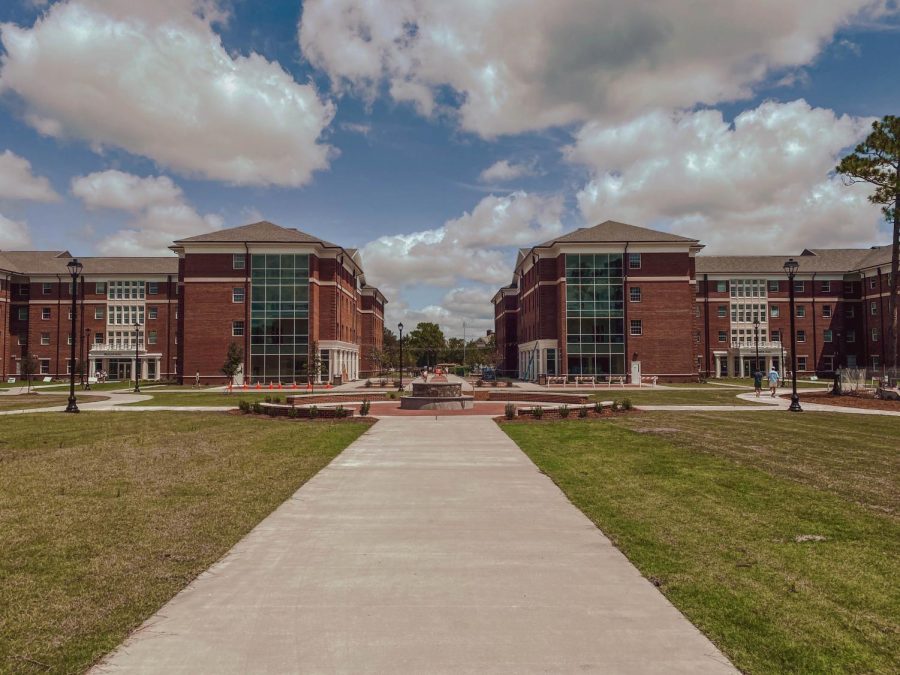OPINION: The move to single-occupancy rooms gives students more space but stirs uncertainty
UNCW’s on-campus housing made the pivot to single occupancy rooms on Sept. 8, about four weeks after the semester began. The announcement was made in regards to concerns from New Hanover’s Health Department due to the rise in the case numbers within the 18-24 age group. Students who were asked to move could either receive a new housing assignment at no additional cost or move home and receive a prorated refund for housing and dining. This does not release students from their 2020-2021 Housing Agreements, as students who choose to leave will not be allowed to move into off-campus housing unless it is with a parent or guardian. With about 3,600 students currently residing on campus, about 800 students will be affected by this displacement. This transition is intended to give students some extra space but it has also caused some uneasiness throughout the on-campus community. Below are arguments in favor and against UNCW’s decision from The Seahawk’s contributing writers, Hannah McDonnell and Hannah Horowitz.
Hannah Horowitz:
Prior to heading into the fall semester, the risk of having double-occupancy rooms was known. Close living quarters and shared spaces are among the highest risk environments for contracting the COVID-19 virus, and all universities were aware of that. The CDC guidelines for congregate living on college campuses offered little to no information on how to successfully manage between 200 to 300 residents sharing spaces such as kitchens, bathrooms and laundry rooms. It simply repeats the same information we’ve heard for months, which is to wear a mask and socially distance yourself from others. They didn’t have a comprehensive plan because they could not, as there is no way to keep residents safe (while being compliant) for the entire semester.
If the university began the semester with the plan to have single occupancy rooms, I would have believed that they valued the health and safety of their students. Making the switch to single occupancy four weeks into the academic year is reckless. Having students relocate all of their belongings across campus is not only inconsiderate but does not promote distancing. Students are still going to visit their roommates and friends that they lived with prior to the move, as this promotes cross-mingling amongst different on-campus residential areas.
According to the UNCW data dashboard, 47% of the beds intended for quarantine/isolation were in use on Sept. 8, the same day the announcement was made. That percentage now hovers around 9%. Students were also allowed the option to quarantine at home, a decision that not only defeats the purpose of eliminating fall break but endangers the lives of their family members. Additionally, the new housing guidance allows those in double occupancy rooms the option to return home, which ignores the advice of numerous top public health officials. Dr. Anthony Fauci, the nation’s top infectious disease expert spoke in regard to the issue on NBC News.
“It’s the worst thing you can do. When you send them home, particularly when you’re dealing with a university where people come from multiple different locations, you could be seeding the different places with infection,” said Fauci.
The administration is also not requiring tests for those who relocate, despite the fact that they could potentially be asymptomatic carriers of the virus. Allowing students to return home without a confirmed negative test can be deadly for family members, especially those in multi-generational households. If anyone ventures outside of the home and is in close contact with other people, they are contributing to the spread of the virus amongst the community.
UNCW was aware that reopening safely with residence halls at full occupancy was impossible without mass testing. However, the administration continued to push to reopen completely for the fall semester, while students and parents bought into the promise of normalcy. It is glaringly obvious why single occupancy rooms were not an option for all first-year students at the start of the semester. The university allowed those who had all fully online classes out of their on-campus housing contracts at a point where only 40% of courses were offered in an online format. Many freshmen were left with the option of either living at school in a risky environment or deferring, something that truly reflects on the motive of financial gain for the university.
The university claims that the case numbers are low but they simply do not have all the data. Unreported cases are a common occurrence, as those who have zero to mild symptoms are less likely to get tested. Students were also relying on pharmacies such as CVS to provide tests prior to UNCW using the CARES Act to cover the costs of on-campus testing. At this point in time, sending students home is a bigger risk than keeping them in Wilmington. The abysmal testing rates are a threat to the community in New Hanover, but sending them back into their home communities would greatly increase the risk of spread. Students need to hold each other accountable in order to stop the spread, no matter if they are on-campus or off.
Although student behavior is one piece of the puzzle, UNCW administration knew the risks of communal living and knowingly placed students in harm’s way. Students are expected to be adaptable, while the administration is mostly concerned about the outcome of their fiscal year. Seeing that blame surface over to student behaviors, I am extremely disappointed in the actions of the UNCW administration. Despite all the looming uncertainty, I can only hope that they are better prepared for next semester.
Hannah McDonnell:
Although this transition is challenging, the school’s administration probably felt as though they could contain the virus within the dorms by limiting visitors and keeping Galloway as the quarantine dorm. Trying to house over three thousand students can be extremely difficult and the administration has to make many challenging decisions. Other universities decided to have single room occupancies from the beginning of the semester. However, UNCW wanted to try something else.
Perhaps they wanted to see how well they could contain the virus. Or perhaps they were using this semester as a test run for how many students they can house efficiently. This is a new experience for everyone involved and to expect the administration to get everything right the first time is too high of an expectation.
Every university and college across the nation is having to figure out the right thing to do without having any history to look back on for help. Nothing like this has happened to where the effects contribute so much to our education. There have been other pandemics before, however most of them were discovered a long time ago and scientists had the opportunity to create a vaccine.
“My roommates and I had a very long discussion on who was staying and who was moving, but we eventually came to the agreement that he was moving and I was going to stay,” said Jimmy Parrish, a UNCW freshman. “Feels weird seeing some people leave and some people going home, having my own room now is also weird but kind of nice.”
“I also think that the administration could have been a little bit more prepared. The day after the RA’s had their emergency meeting, they made their decision. I believe they could have come to their decision a little later after the meeting. It will help out by taking people out of the dorms where the spread is an issue, but at the apartments, there is more leniency what happens in the rooms. I think it will be better by next semester, but not resolved. By next semester, they will have a better understanding.”
Jimmy goes on to say that he wishes he had been assigned to a single room in the first place because he has grown attached to his roommates and now he has to walk a mile just to go see him. If the two of them had not come to an agreement, Jimmy stated that they would have probably flipped a coin on who would stay and who would go.
About eighty years ago, the influenza vaccine was created. Most of the scientists that worked on that vaccine are dead by now and the COVID-19 virus is most similar to influenza. Scientists nowadays did not experience when influenza spread on such a large scale. If scientists need time to figure out what to do and how to fix things, then so do the universities.











